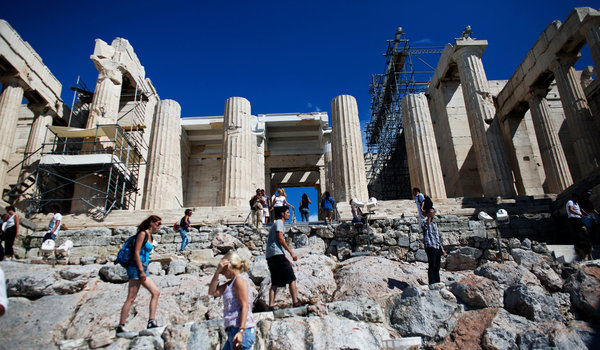This article, entitled “Debt-Ridden Greece Hopes Ancient Sites Can Yield New Cash,” from the New York Times, reflects our discussion of cultural tourism on an even larger scale. As we have seen, cultural sites often turn to tourism to help bring in desperately needed money. In the face of public funding cuts, officials of Greece’s national landmarks are using a similar principle. In addition to promoting tourism, these sites are trying to attract foreign filmmakers, fashion photographers and advertising firms by lowering their once high “rental” prices to $1,300 a day for photographers and $2,000 a day for film crews, and by simplifying their bureaucratic process.
These low prices seemingly invite anyone with a little money to come in and take over valuable sites like the Acropolis, making Greece’s heritage the backdrop for a cheesy commercial or the setting for an epic shootouts. As with many of the local tribal sites we have discussed, there is a major concern that such tourism and advertising could demean one’s history and culture and make it seem inauthentic. I believe that in opening up these sites to such advertising firms, there is a risk that the importance of a site and its identity could be lost. While tourists come for the culture and experience, using an archaeological site in advertisements for products unrelated to the site or as the background for a women in fancy evening gowns could dissociate the place from its meaning for consumers. To protect these sites I feel that any films or photography shoots that use the site need to, in some way, benefit the public’s understanding of the site, rather than just use it as a pretty background or to stir intrigue.
However, as the country’s archaeological council is allegedly very stringent on who they give permission to, hopefully no real danger is posed. As long as officials are careful and do not allow sites like the acropolis to become too overdone or take a backseat to company’s product promotions, Greece’s national archaeological monuments should maintain their integrity and significance. Hopefully these new advertising means can make the public aware of new sites, increase tourism, and promote a positive image of Greece in a time of financial troubles, in addition to promoting their products or providing entertainment.

